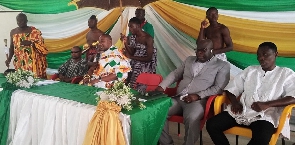The Omanhene of the Atebubu Traditional Area, Ohenpong Yeboah Asiamah I has outlined a seven-year development plan for the Atebubu traditional area.
He made this known at a town hall meeting as part of this year’s ‘Foryawo’ Yam Festival of the chiefs and people of Atebubu under the theme ‘Championing Education As The Bedrock For Development’.
Ohenpong Yeboah Asiamah indicated that the plan will hinge on seven pillars namely:
* Agricultural development and environmental initiatives,
* Tourism and Traditional Leadership,
* Education and Human Capital Development,
* Boosting Health, Sanitation
* Sustainable Water Supply,
* Infrastructure Development,
* Building Strategic Partnerships as well as working for unity to facilitate progress.
The Omanhene said this could be achieved if the people imbibe some seven core values which include: respect, excellence, integrity, collaboration, responsibility, innovation, and sustainability.
Throwing more light on plans to boost education, the Omanhene hinted at the creation of an education secretariat, provision of scholarships for brilliant students, rewarding academic excellence, equipping the Atebubu library with modern equipment, and promoting vocational and skills training with priority for girls.
He called for the support of everyone to help realize the ideals of the plan.
The Atebubu-Amantin municipal chief executive Hon. Edward Owusu who described the meeting as an ‘innovation’, in reference to the theme said education is key to the development of every country.
He enumerated a number of achievements in the education sector in the municipality in the last six and half years and pledged the cooperation of the municipal assembly towards the achievements of the objectives of the seven-year development plan.
During an open forum, contributors made a wide range of suggestions touching on bad roads, lack of effective sub-structures of the assembly, bad sanitation practices, and indiscipline among the youth while others asked questions to which answers were provided by the relevant authorities.
Present were members of the Atebubu traditional council, heads of institutions the clergy, and individuals from both home and abroad.
Regional News of Monday, 16 October 2023
Source: Daniel Oduro-Stewart, Contributor

















